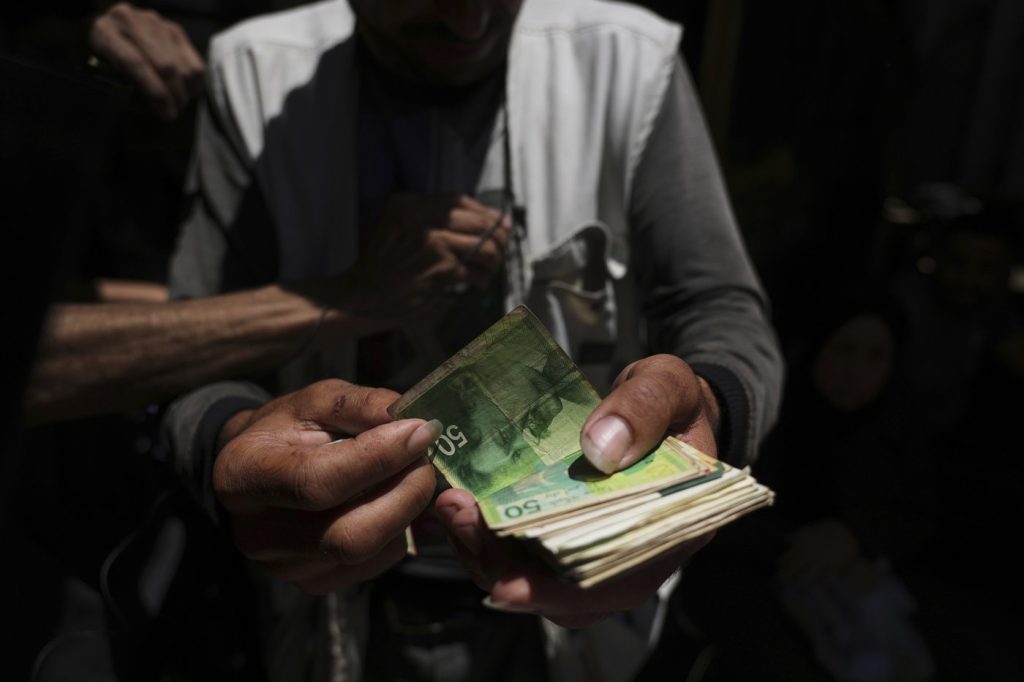DEIR AL-BALAH, Gaza Strip (AP) — The ongoing war in the Gaza Strip has severely impacted the economy, which is now faced with a critical cash shortage. As essential resources such as food, fuel, and medicine become increasingly scarce, cash has emerged as the most crucial necessity for residents in this war-torn territory. The vast majority of bank branches and ATMs are inoperative, leading people to rely on an unregulated network of cash brokers, with transaction commissions skyrocketing to about 40%.
Ayman al-Dahdouh, a school director in Gaza City, highlighted the dire situation, stating, “The people are crying blood because of this. It’s suffocating us, starving us.” As inflation surges, unemployment remains high, and savings dwindle, many families are pushed to sell their belongings to afford essential goods. Merchants, wary of accepting noteworthies that have become frayed and worn, are contributing to the cash crisis, especially since Israel has ceased supplying new bank notes to the territory.
Experts point to several factors contributing to Gaza’s financial woes. Israel implemented a blockade on cash entering Gaza at the war's onset to disrupt Hamas' financial operations. Concurrently, many wealthy families withdrew their funds from banks and left the territory, creating a vacuum in available cash. Additionally, increased caution from foreign businesses has led them to demand cash payments, exacerbating the situation.
The dwindling cash supply has caused cash broker commissions to surge from around 5% to nearly 40%. Residents, in need of cash for everyday transactions, now face significant losses. For example, Mohammed Basheer al-Farra, displaced from Khan Younis, shared that he needed to transfer $100 to receive only $60 in cash, emphasizing how essential goods have become unaffordable.
As of 2024, inflation in Gaza reached a staggering 230%, according to the World Bank, decreasing temporarily during a ceasefire in January, only to resurge following a breakdown in the truce in March. By the end of the year, approximately 80% of the population was unemployed, with many relying on direct deposits into bank accounts for whatever income they have. However, cash is still necessary for purchasing food, water, and other essentials, as al-Dahdouh pointed out, stressing the critical role it plays in daily life.
Families like Shahid Ajjour’s were struggling as their pharmacy and business fell victim to the war, forcing them to depend on dwindling savings. Ajjour explained that her family of eight had to sell their gold in exchange for basic supplies; flour, which used to cost less than $4, now costs about $12 every two days. Prices for sugar and gasoline have soared as well, indicating the overall economic distress faced by the populace.
With currency in poor condition due to relentless use and no new supply, small business owners were under pressure from suppliers demanding pristine notes. Flour merchant Thaeir Suhwayl noted his suppliers required payments in new 200-shekel notes, which are becoming increasingly rare. Attempts to use tattered bills often result in refusal, leaving individuals like Ajjour feeling that “the worth of your $50 is zero in the end.”
This situation has spawned a new industry in Gaza focused on repairing worn notes, with costs ranging from 3 to 10 shekels ($1-$3). However, even repaired notes are sometimes rejected, further complicating daily transactions for residents struggling to maintain any semblance of normalcy.
The war's impacts have created a scenario where those with cash reserves – primarily cash brokers – hold significant power over the populace. Mahmoud Aqel, a displaced individual, expressed concerns about the unchecked influence brokers have. The chaotic market dynamics and price fluctuations make regulation nearly impossible, as noted by Dalia Alazzeh, a finance expert from the University of the West of Scotland. Previous attempts to address the crisis, such as a digital payment initiative called Iburaq established by the Palestine Monetary Authority, faced setbacks as merchants favored cash transactions.
While Israel intensifies its financial restrictions to pressure Hamas, the role that cash brokers play remains ambiguous. They often reap significant benefits from inflated commissions on transactions, which leads to a scenario where families ultimately rely on humanitarian aid when cash runs out. Al-Farra’s admission of having to seek food aid from distribution centers highlights the desperation many face, further illustrating the struggles endured by Gaza’s inhabitants amidst this economic collapse.











